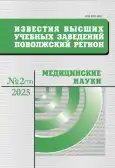Peuttz – Jeghers syndrome in a child patient (clinical case)
- Authors: Krasnova L.I.1, Iskanderova L.R.2, Akchurina A.M.1, Modyakova K.A.1, Maksimova M.N.3
-
Affiliations:
- Penza State University
- Penza Regional Children’s Clinical Hospital named after N.F. Filatov
- Penza Institute of Advanced Medical Studies – branch of the Federal State Government-financed Educational Establishment of Additional Professional Education “Russian Medical Academy of Life-long Professional Learning” of the Ministry of Healthcare of the Russian Federation
- Issue: No 2 (2025)
- Pages: 75-82
- Section: INTERNAL DISEASES
- URL: https://journal-vniispk.ru/2072-3032/article/view/306599
- DOI: https://doi.org/10.21685/2072-3032-2025-2-7
- ID: 306599
Cite item
Full Text
Abstract
Background. In pediatric practice, there is a rare, difficult–to–diagnose hereditary disease, Peitz – Jaegers syndrome. This disease is characterized by lesions of the mu cousmembranes in the form of pigment spots, polyps of the gastrointestinal tract in chil dren and leading to an increased risk of tumor diseases. It is these patients who should be monitored using modern methods of diagnosing the disease. The purpose of the study is to demonstrate and analyze a clinical case in a pediatric patient in order to increase the alert ness of pediatricians regarding a rare disease. Materials and methods. A local, multidisciplinary, demonstration study was conducted, including the manifestations of a clinical case of Peutz-Jaegers syndrome in a pediatric patient during hospitalization at the Penza Region al Children’s Clinical Hospital named after N.F. Filatov. The diagnosis was verified by taking into account complaints, the medical history and life of the child, his objective examination and laboratory and instrumental indicators. Results. Peitz – Jaegers syndrome is a fairly rare hereditary disease. This pathology can be assumed on the basis of a hereditary history, as well as a clinic. Peitz – Jaegers syndrome really requires special attention in the management of patients, especially in childhood, since the risk of developing severe com plications and a tendency to form malignant tumors is high. Conclusions. This case illustrates important aspects of Peitz-Jaegers syndrome in a pediatric patient. We have taken steps to increase the alertness of pediatricians regarding a rare serious hereditary.
Keywords
About the authors
Lyudmila I. Krasnova
Penza State University
Author for correspondence.
Email: lik72@list.ru
Candidate of medical sciences, associate professor of the sub-department of pediatrics, Medical Institute
(40 Krasnaya street, Penza, Russia)Larisa R. Iskanderova
Penza Regional Children’s Clinical Hospital named after N.F. Filatov
Email: lik72@list.ru
Head of the department of pediatrics
(43 Bekeshskaya street, Penza, Russia)Alsu M. Akchurina
Penza State University
Email: lik72@list.ru
Student, Medical Institute
(40 Krasnaya street, Penza, Russia)Ksenia A. Modyakova
Penza State University
Email: poli27041999@mail.ru
Resident of the sub-department of pediatrics, Medical Institute
(40 Krasnaya street, Penza, Russia)Marina N. Maksimova
Penza Institute of Advanced Medical Studies – branch of the Federal State Government-financed Educational Establishment of Additional Professional Education “Russian Medical Academy of Life-long Professional Learning” of the Ministry of Healthcare of the Russian Federation
Email: poli27041999@mail.ru
Candidate of medical sciences, associate professor of the sub-department of pediatrics
(8A Stasova street, Penza, Russia)References
- Arapova V.V., Mosesova E.A., Fedorova E.I. Difficulties in diagnosing aplastic anemia. Rossiyskiy pediatricheskiy zhurnal = Russian pediatric journal. 2021;(2):30. (In Russ.)
- Belysheva T.S., Nasedkina T.V., Valiev T.T., Matinyan N.V., Malikhova O.A., Semenova V.V., Kozlova V.M., Kazubskaya T.P., Vishnevskaya Ya.V., Mikhaylova S.N., Varfolomeeva S.R. Peutz-Jeghers syndrome: a multidisciplinary approach to diagnosis using a clinical case as an example. Rossiyskiy zhurnal detskoy gematologii i onkologii = Russian journal of pediatric hematology and oncology. 2021;8(4):95–102. (In Russ.). doi: 10.21682/2311-1267-2021-8-4-95-102
- Dos Santos V.M., Dos Santos L.A.M., Modesto L.C. Peutz–Jeghers syndrome: revisited. Autops Case Rep. 2022;12:e2021384. PMID: 35642203.
- Taganov A.V., Tamrazova O.B., Molochkov A.V. et al. Peutz-Jeghers syndrome in pediatric dermatological practice. Rossiyskiy vestnik perinatologii i pediatrii = Russian bulletin of perinatology and pediatrics. 2021;66(2):123‒129. (In Russ.)
- Kareva M.A., Sozaeva L.S., Chugunov I.S., Peterkova V.A., Mikhalina S.D. Prepubertal gynecomastia at the onset of hereditary tumor predisposition syndrome (description of clinical cases). Problemy Endokrinologii = Issues of endocrinology. 2023;69(4):101‒106. (In Russ.). doi: 10.14341/probl13239
- D'yakonova E.Yu., Bekin A.S., Lokhmatov M.M. et al. Peutz-Jeghers syndrome in children - diagnostic difficulties using a clinical case as an example. Status Praesens. Pediatriya = Status Praesens. Pediatrics. 2023;(2):13–20. (In Russ.). Available at: https://praesens.ru/zhurnal/elektronnyy-zhurnal/sp-ped/
- Sandru F., Petca A., Dumitrascu M.C. et al. Peutz–Jeghers syndrome: Skin manifestations and endocrine anomalies: Review. Exp. Ther. Med. 2021;22(6):1387. PMID: 34650635.
- Kirakosyan E.V., Lokhmatov M.M., D'yakonova E.Yu. High-tech diagnostics and enteroscopic treatment of children with Peutz-Jeghers syndrome. Rossiyskiy pediatricheskiy zhurnal = Russian pediatric journal. 2019;22(1):17‒22. (In Russ.)
- Chiraphapphaiboon W., Thongnoppakhun W., Limjindaporn T. et al. STK11 causative variants and copy number variations identified in Thai patients with Peutz–Jeghers syndrome. Cureus. 2023;15(2):e34495. PMID: 36874343].
- Sfakianaki M., Papadaki C., Tzardi M. et al. Loss of LKB1 protein expression correlates with increased risk of recurrence and death in patients with resected, stage II or III colon cancer. Cancer Res. Treat. 2019;51(4):1518‒1526. PMID: 30913862.
Supplementary files
























